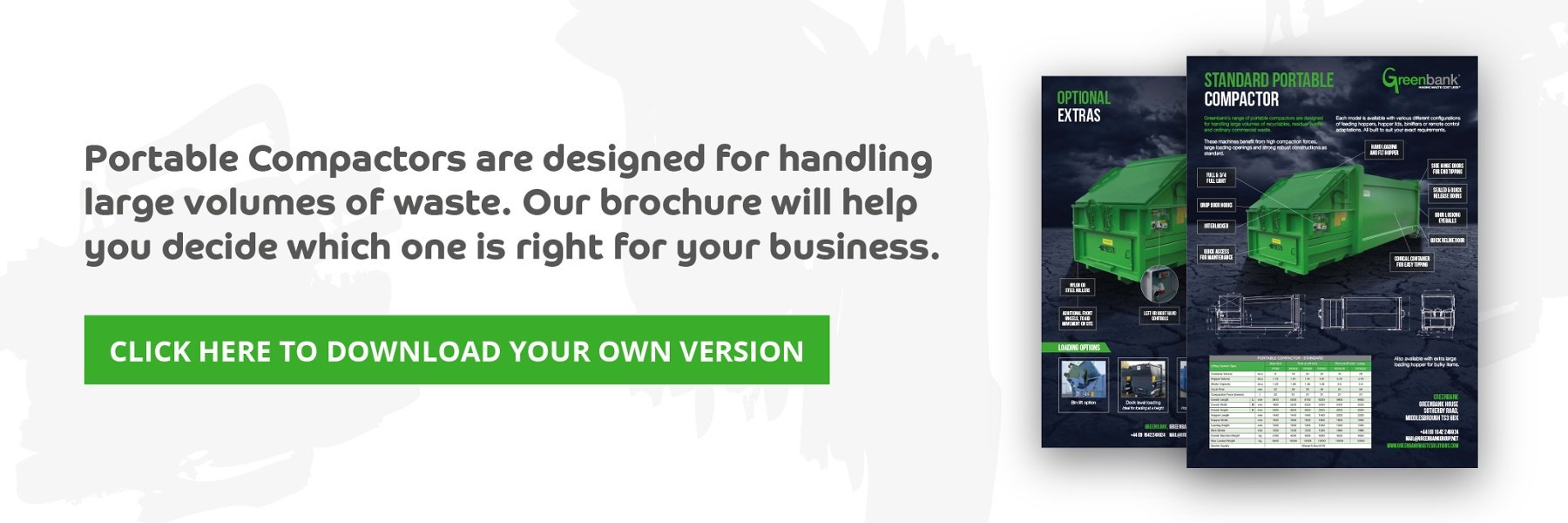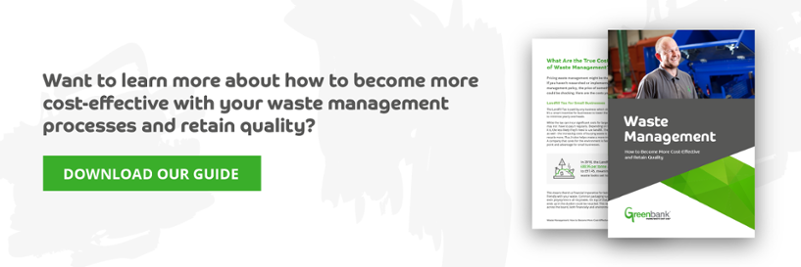A portable waste compactor reduces the volume of space required to store waste. This means fewer collections are needed for disposal, leading to an ultimately lower business cost.
Portable waste compactors are smaller and more flexible in space requirements than static compactors, making them perfect for manoeuvrability and even greater hygiene – but what else do they guarantee?
Let’s explore the benefits of a portable waste compactor and the information surrounding compactors in general.
- Benefits of a Portable Waste Compactor
- Why Compactors?
- Portable vs. Static Waste Compactors
- Considerations for Compactors
Benefits of a Portable Waste Compactor
The initial benefit of a portable waste compactor is in the name – they’re portable! For smaller businesses who possibly have limited space on their premises, this means they require less room and are easy to move if required.
As they’re smaller than static waste compactors, they fill up quicker, yet are the perfect choice if you’re producing smaller amounts of waste.
Portable waste compactors are available with low feed openings (for ease of loading), differing configurations of feed hoppers, remote control box, bin lifters and also drainage points. Some portable compactors also come with the added benefit of a self-cleaning compaction blade, which helps to avoid the issue of leaking waste and unwanted vermin.
Portable Waste Compactors Enable More Hygienic Working Environments
One of the main focuses for organisations considering waste compactors is the waste type produced and whether there is space to store it. One of the main benefits of a portable waste compactor is that it is fully enclosed, meaning waste is completely contained.
Once full, the unit is removed off-site. Whereas, with a static compactor being fixed to the ground, it can potentially mean that waste is spilt when transferred to a skip. Waste can also find itself falling underneath the static compactor, being difficult to move and resulting in a hygiene issue. Essentially, a portable compactor is about ensuring better use of space, flexibility and hygiene.
Why Compactors?
There are several benefits that come with investing in a compactor. They’re long-term solutions to long-term waste management needs, guaranteeing more efficient use of space, labour and waste. Waste compactors can guarantee a 90% reduction in the size of your waste, which is a huge decrease.
Compactors can deliver:
- Reduced traffic on your premises: Lower waste volume means fewer collections are needed
- Reduced labour costs: Compactors can be loaded by bin tippers, conveyor belts and even dump trucks, eliminating the need to handle waste directly. Even without these, the cost of labour is reduced as compactors can fit a larger amount of waste inside them when compared to traditional waste solutions, such as wheelie bins.
- Environmental benefits: Less space used in landfills means more efficient use of space overall. Fewer collection trips mean less CO2 emissions attributed to your work.
- Safer work environment: Compacted waste is easy to store and less able to pose hygiene issues. It’s less likely to cause any trips or accidents through proper storage and can limit any rodent or smell issues.
- Reduced business costs: Waste handling, wheelie bins and skips – all costs directly attributable to poorly managed and poorly stored waste. With a compactor, the need for those items decreases, lowering your expenses and creating healthier overheads.
To see the actual specifications offered by portable compactors, you can choose to download our brochure. Inside, you’ll find all the relevant information on different models of portable compactor available, alongside their specs and capabilities. Just click below for your free copy.

Portable vs. Static Waste Compactors
Static compactors are larger. They’re usually bolted to the floor in a designated area and can compact larger amounts of waste. They’re a good investment for medium to larger-sized businesses who produce a lot of waste and also have a good amount of space on their premises to house the machine.
Similar to the portable waste compactors, they’re usually also customisable. Unfortunately, many static compactors don’t have a watertight seal and therefore cannot deal with any wet waste that needs to be disposed of.
Obviously, these compactors are best used for larger waste sizes, but do raise considerations when it comes to space and flexibility. What other considerations are there for anyone interested in waste compactors?
Considerations for Compactors
For businesses thinking about investing in a portable waste compactor, consider the following questions:
- What amounts of waste are you creating?
- What types of waste are you creating? Compactors generally handle black bag waste, wet waste, plastic wrapping and spent packaging materials.
- Where on your site can you fit a compactor? Evidently, the size of your compactor depends on the amount of waste you produce and the space you have to store it. If space is a limiting factor, choose a portable compactor.
Portable waste compactors are wise choices for anyone looking to lower their business costs while remaining compliant with waste regulations and ensuring a more effective waste management policy. But what else can you do as a business to create this environment? Read our guide to find out.
Cutting Waste Management Costs and Retaining Quality
Here at Greenbank, we’ve created a guide on how to get the most out of your waste management policies. It covers information such as the true costs of waste management, practices for compliant cost-cutting and tips on finding the right waste management machinery.
Just click the link below to get your own copy.





